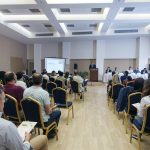
SUMMARY OF ACTION
Entrepreneurship in the agri-food sector was the focus of a workshop organized on Saturday, May 27 in Kalamata, by the Center of Agri-Food Entrepreneurship in Messinia. During the proceedings, distinguished scientists and successful entrepreneurs imparted their accumulated knowledge and experience on agri-food entrepreneurship issues. The aim of the seminar was to highlight the requirements and critical points in order to create a successful agri-food business. At the end of the Center’s second round of experiential seminars aimed at adults, 18 participation certificates were handed out.
The program of the speeches was as follows:
Athanasios Krystallis, Food Marketing Professor at Aarhus University in Denmark, spoke about the importance of marketing research in creating satisfied customers, focusing on the case of olive oil. Providing a definition for marketing science, he said: “Marketing is a set of operations and procedures for creating, distributing and communicating products and services that have a value for consumers, customers, associates and society in general.” He also referred to marketing tactics, and how satisfied food consumers are “created.” He presented specific characteristics that constitute criteria for consumers when selecting olive oil (eg. general appearance, organoleptic characteristics, label information, price and packaging innovations) and added that perceived quality, health-related consumption and moral behavior create the link between olive oil and incentives and values.
Peter Poulos referred to the axes that can build up the Greek brand abroad, representing the award-winning “Navarino Icons” product line, which comprises traditional Costa Navarino farm produce.”Respect, promotion, education, cooperation and pride are the five pillars that can help Greek quality products build a strong brand abroad,” he said, analyzing the axes one by one.
Dr. Philippos Papadopoulos, director of the Strategic Project Management Office of the American Farm School, referred to the challenges that entrepreneurship imposes on the agri-food sector. “We must find ways to utilize our tradition, in order to design products and services that are recognized as ‘authentic’ by today’s consumer, and are in accord with consumer habits and tendencies. Moreover, we ought to use proper standardization and economical production methods. We need to provide them, of course, to the most attractive markets via the most appropriate distribution channels,” he said, while clarifying that the role of an advisory service is to help the entrepreneur cope with the challenges of each stage his business is at, and move it to the next stage. “This can be done through the management of production, administration, entrepreneurship and organization,” he concluded.
Next came the presentation of two successful agri-food business examples. The quality manager of the “Stathoris” cheese factory, Nikos Gizgis, stressed that the business started out in the 80’s as a livestock unit with a small traditional dairy, following the graduation of the owner, Ioannis Stathoris, from the Dairy School of Ioannina. “In 2005, the small unit developed into an ultra-modern production and trade unit for dairy products. Tradition, however, remains at the core of the new production processes, which abide by strict hygiene rules according to legislation,” he said. Three years later, the Food Safety Management System certified the cheese factory according to the International Standard ELOT EN ISO 22000, by world-famous British certification body “Lloyds Register,” and it has kept its certification to this day via rigorous annual audits.
“Innovation in entrepreneurship” was the title of the talk given by founder and general manager of “AgriFarm,” Dimitris Gremyloyannis. “Stathoris” company was founded in December 2013 in Lamia, specializing in the production and distribution of agricultural products cultivated in a completely natural way, both in private farms in Central Greece and in selected agricultural areas elsewhere in Greece. The company has developed and implemented the program named “Re-Farming,” which is an integrated management system of the local agricultural production, with the aim of improving the production quality of agricultural produce.
For more information please contact us at 2721025700 και 6985666456,
e-mail: [email protected] site : www.kaem.gr




